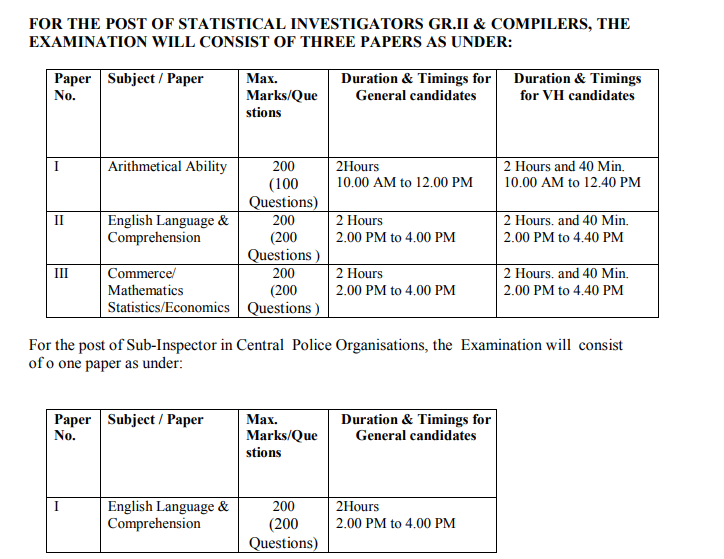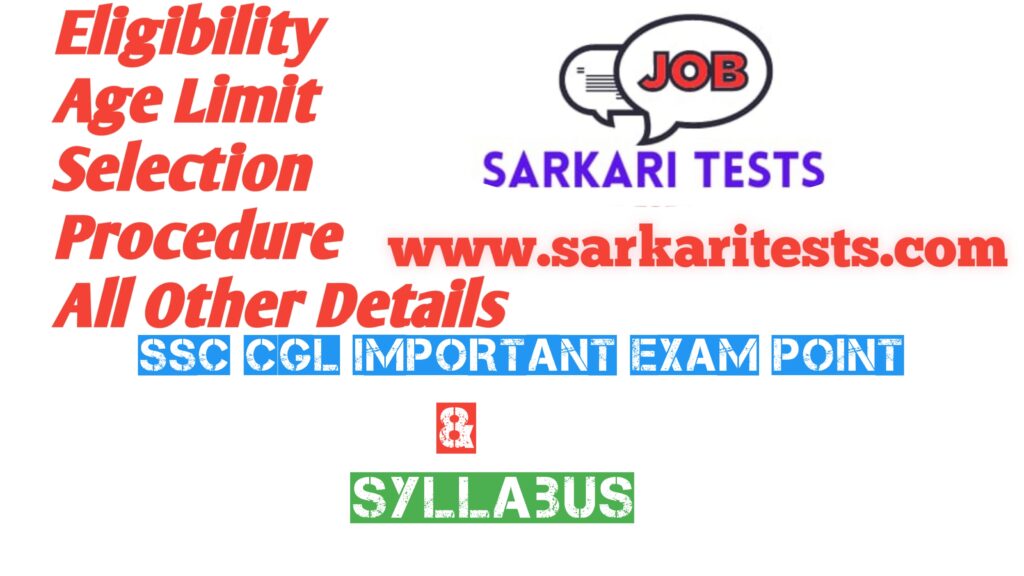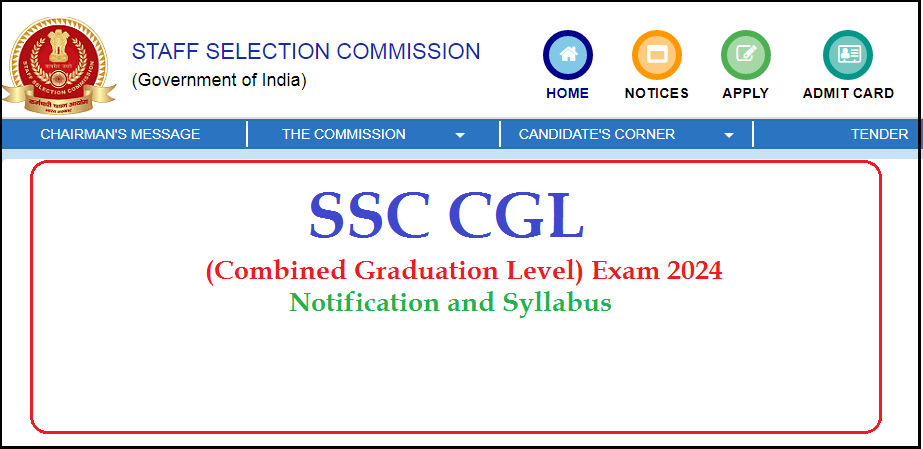SSC CGL Important Exam Point and Syllabus
| SSC CGL 2024: Know the detailed SSC CGL 2024 syllabus including subject-wise topics for SSC CGL Tier 1, Tier 2, and Tier 3 exams in this post so that you can prepare effectively with the latest updates and important study material. Read the full post to start your SSC CGL preparation now. SSC CGL Important Exam Point and Syllabus. |
SSC CGL Important Exam Point and Syllabus
| SSC CGL Important Exam Point |
The Scheme of the Combined Graduation Level Examination will be conducted in three tiers as mentioned below:
| 1st Tier — Online Written Examination (Objective Multiple Choice Type). |
| 2nd Tier — Main Written Examination (Objective Multiple Choice Type). |
| 3rd Tier — Personality Test /Interview or Skill Test, where applicable. |
SSC CGL Important Exam Point in Hindi
संयुक्त स्नातक स्तरीय परीक्षा को तीन स्तरों में आयोजित किया जाता है जैसा कि नीचे उल्लेख किया गया है:
| पहला स्तर – ऑनलाइन लिखित परीक्षा (वस्तुनिष्ठ बहुविकल्पीय प्रकार) |
| दूसरा स्तर – मुख्य लिखित परीक्षा (वस्तुनिष्ठ बहुविकल्पीय प्रकार) |
| तीसरा स्तर – व्यक्तित्व परीक्षण / साक्षात्कार या कौशल परीक्षण, जहाँ लागू हो |
सीपीओ में उप-निरीक्षक के पद के लिए चयन करने वाले उम्मीदवारों को टियर I के परिणाम की घोषणा के बाद किसी भी सुविधाजनक समय पर अपने शारीरिक परीक्षा/शारीरिक सहनशक्ति परीक्षण (पीईटी) / चिकित्सा परीक्षा से गुजरना होता है।
(ए)। संयुक्त स्नातक स्तरीय (टियर-I) परीक्षा: संयुक्त स्नातक स्तरीय परीक्षा का टियर-I सभी श्रेणियों के पदों के लिए समान होगा और एक सत्र में आयोजित किया जाएगा
| Official Website | Click Here |
| Subjects |
| Part | Subject |
| A | General Intelligence & Reasoning |
| B | General Awareness |
| C | Numerical Aptitude |
| D | English Comprehension |
Questions will be of Objective Multiple Type Choice. The questions will be set in
Hindi/English in respect of Parts A, B and C.
| SSC CGL Syllabus Details |
| SSC CGL पाठ्यक्रम परीक्षा : परीक्षा का टियर-I |
(A) : सामान्य बुद्धि और तर्क:
इसमें मौखिक और गैर-मौखिक दोनों प्रकार के प्रश्न शामिल होंगे।
इस घटक में सादृश्य, समस्या समाधान, विश्लेषण, निर्णय, निर्णय लेने, दृश्य स्मृति, समानता और अंतर, स्थानिक दृश्य, स्थानिक अभिविन्यास, भेदभाव, अवलोकन, संबंध अवधारणाएं, अंकगणितीय तर्क और आकृति वर्गीकरण, अंकगणितीय संख्या श्रृंखला, गैर-मौखिक श्रृंखला, कोडिंग और डिकोडिंग, कथन निष्कर्ष, न्याय तर्क आदि पर प्रश्न शामिल हो सकते हैं।
(B) : सामान्य जागरूकता:
इस घटक में प्रश्नों का उद्देश्य उम्मीदवारों की अपने आस-पास के वातावरण और समाज में इसके अनुप्रयोग के बारे में सामान्य जागरूकता का परीक्षण करना होगा। प्रश्न वर्तमान घटनाओं और हर दिन के अवलोकन और अनुभव के ऐसे मामलों के वैज्ञानिक पहलू के ज्ञान का परीक्षण करने के लिए भी डिज़ाइन किए जाएंगे, जैसा कि किसी भी शिक्षित व्यक्ति से अपेक्षित हो सकता है। परीक्षा में भारत और उसके पड़ोसी देशों से संबंधित प्रश्न भी शामिल होंगे, खासकर खेल, इतिहास, संस्कृति, भूगोल, आर्थिक परिदृश्य, सामान्य राजनीति, भारतीय संविधान, वैज्ञानिक अनुसंधान आदि से संबंधित। ये प्रश्न ऐसे होंगे कि उन्हें किसी विषय के विशेष अध्ययन की आवश्यकता नहीं होगी। सी. संख्यात्मक योग्यता: प्रश्न उम्मीदवारों की संख्याओं के उचित उपयोग की क्षमता और संख्या बोध का परीक्षण करने के लिए डिज़ाइन किए जाएंगे। परीक्षा का दायरा पूर्ण संख्याओं, दशमलव और अंशों की गणना और संख्याओं के बीच संबंधों पर आधारित होगा। यह संख्याओं के बीच क्रम की समझ, एक नाम से दूसरे नाम में अनुवाद करने की क्षमता, परिमाण के क्रम की समझ, गणना के परिणाम का अनुमान या भविष्यवाणी, वास्तविक जीवन की समस्याओं के समाधान के लिए उपयुक्त ऑपरेशन का चयन और उत्तर खोजने के लिए वैकल्पिक गणना प्रक्रियाओं के ज्ञान का परीक्षण करेगा। प्रश्न भी अंकगणितीय अवधारणाओं और संख्याओं के बीच संबंधों पर आधारित होंगे, न कि जटिल अंकगणितीय गणना पर (प्रश्नों का मानक 10+2 स्तर का होगा)। डी. अंग्रेजी समझ:
उम्मीदवारों की सही अंग्रेजी समझने की क्षमता, उनकी बुनियादी समझ और लेखन क्षमता आदि का परीक्षण किया जाएगा।
(घटक ए, बी और डी में प्रश्न पद के लिए निर्धारित आवश्यक योग्यता अर्थात स्नातक के अनुरूप स्तर के होंगे)।
(C) : एसएससी सीजीएल संयुक्त स्नातक स्तरीय (टियर-II) परीक्षा के लिए परीक्षा की योजना:
संयुक्त स्नातक स्तरीय परीक्षा -2024 का टियर-II वस्तुनिष्ठ प्रकार का बहुविकल्पीय होगा और सप्ताहांत में दो दिनों में आयोजित किया जाएगा। इसमें तीन अलग-अलग पेपर/विषय शामिल होंगे और आवेदन किए गए पदों की श्रेणी के आधार पर, उम्मीदवार को एक, दो या तीन पेपर, जैसा भी मामला हो, में उपस्थित होना होगा।
सहायक, आयकर निरीक्षक/केंद्रीय उत्पाद शुल्क निरीक्षक, निरीक्षक (पीओ), निरीक्षक (परीक्षक) सीबीआई में उपनिरीक्षक, डाक निरीक्षक, सहायक प्रवर्तन अधिकारी, संभागीय लेखाकार, लेखाकार, लेखा परीक्षक, कर सहायक, यूडीसी के पद के लिए परीक्षा में दो पेपर होंगे:

- The Commission will have the full discretion to fix separate minimum qualifyingmarks in each of the papers and in the aggregate of all the papers separately foreach category of candidates (viz. SC/ST/OBC/PH/ExS/General (UR) ). Onlythose candidates who qualify in all the papers as well as in the aggregatewould be eligible to be considered for being called for the Personality Test/Interview and/or Skill Test.
2. There will be different set of Questions for the papers on Arithmetic &
General Studies for Visually Handicapped (VH) candidates which shall not
have any component of Map/Graphs/Statistical Data/
Diagrams/Figures/Geometrical problems/Pie-chart etc. However,
components of other papers will be the same as that for general candidates.
| SSC CGL SYLLABUS : TIER-II OF THE EXAMINATION |
| Paper-I : Arithmetic Ability : This paper will include questions on problems relating to Number Systems, Computation of Whole Numbers, Decimals and Fractions and relationship between Numbers, Fundamental Arithmetical Operations, Percentage, Ratio and Proportion, Average, Interest, Profit and Loss, Discount, Use of Table and Graphs, Mensuration, Time and Distance, Ratio and Time etc. |
| Paper-II : English Language & Comprehension :Questions in this components will be designed to test the candidate’s understanding and knowledge of English Language and will be based on error recognition, fill in the blanks (using verbs, preposition, articles etc), Vocabulary, Spellings, Grammar, Sentence Structure, Synonyms, Antonyms, Sentence Completion, Phrases and Idiomatic use of Words, etc. There will be a question on passages and comprehension of passages also. (The standardof the questions will be of 10+2 level). |
| Paper-III : Commerce/Mathematics/Statistics/Economics for Investigator Grade-II, for Ministry of Statistics & Program Implementation and Compiler for Registrar General of India, Ministry of Home Affairs. (?)A. STATISTICSProbability, Probability Distributions, Binomial, Poisson, Normal, Exponential.Compilation, classification, tabulation of Statistical Data, Graphical presentation of data. Measures of central tendency, measures of dispersion, measures of association and contingency, scatter diagram, correlation coefficient, rank correlation coefficient and linear regression analysis ( for two or more variables ) excluding partial correlation coefficients.Concept of Population, random sample, parameters, statistics, sampling distribution of x properties of estimators and estimation of confidence intervals. |
Principles of sampling, simple random sampling, stratified sampling, systematic sampling etc., Sampling and non-sampling errors, type-I and type-II errors.
Concepts of Hypothesis – Null and alternate, Testing of hypothesis for large samples as well as small samples including Chi-square tests ( Z, t, F, 2 tests ).
Index Numbers, Time series analysis – components of variation and their estimation.
B. ECONOMICS GENERAL ECONOMICS
- Demand and Supply Analysis, including Laws and Interaction of Demand and Supply.
- Production Function and Laws of Returns.
- Commodity Pricing – Characteristics of various Market Forms and Price Determination under such
Market Forms. - Theory of Factor Pricing – Rent, Wage, Interest and Profit.
- Theory of Employment – Classical and Neo-classical Approach.
- Keynesian Theory of Employment – Principles of Effective Demand. Meaning and Importance of
Investment, Relation between Saving and Investment, Multiplier Effect and the process of Income
Generation, Post Keynesian Development. - Nature and Functions of Money, Value of Money, Fluctuations in the value of Money – Inflation and
Deflation, Monetary Policy, Index Number. - International Trade-Free Trade and Protection, Theories of International Trade.
- Foreign Exchange – Determination of the rate of Exchange – Purchasing Power Parity theory and
Balance of Payment Theory. - Public Finance – Nature. Scope and importance of Public Finance.
- Taxation – Meaning, Classification and Principles of Taxation, Incidence of Taxation.
- Deficit Financing.
- Fiscal Policy.
INDIAN ECONOMICS AND GENERAL STATISTICS - Statistical Investigation – Meaning and Planning of Investigation.
- Collection of data and editing of data.
- Types of sampling.
- Schedule and questionnaire.
- Presentation of data – classification, tabulation, etc.
- Measures of Central Tendency.
- National Income and Accounting – Estimation of National Income, Trends in National Income,
Structural changes in the Indian Economy as seen in National Income Data. - Agricultural sector – Agricultural Development during Plan Period, Rural Credit, Agricultural Price
Policy, Rural Development Co-operation and Panchayati Raj. - Industrial Policy and Industrial Development.
- Problems of Economic Development – Indian Planning – Objectives, Techniques and its evolution, Five
Year Plans and Role of National Development Council. - Profile of Human Resources – Population and Economic Development, Demographic Profile of India,
Nature of Population Problem – Poverty, Inequality, Unemployment Problem, Labour Problem,
Population Control and Government Policy. - New Economic Policy and Welfare Schemes.
- Indian Public Finance – Indian Revenue, Foreign Aid.
- Indian Banking and Currency system.
C. MATHEMATICS
D. COMMERCE
SSC CGL Important Exam Point and Syllabus
Posted By- WWW.SARKARITESTS.COM

Welcome to this Official Website Of Sarkari Tests There are many Websites similar to the name of Sarkari Tests,So you have to be Careful, to open the real Website Sarkari Tests.Here we provide all kinds of Updates related to Jobs, Results, Admit cards, Syllabus And Admissions Free Of Cost.
Thanks For Visiting…
